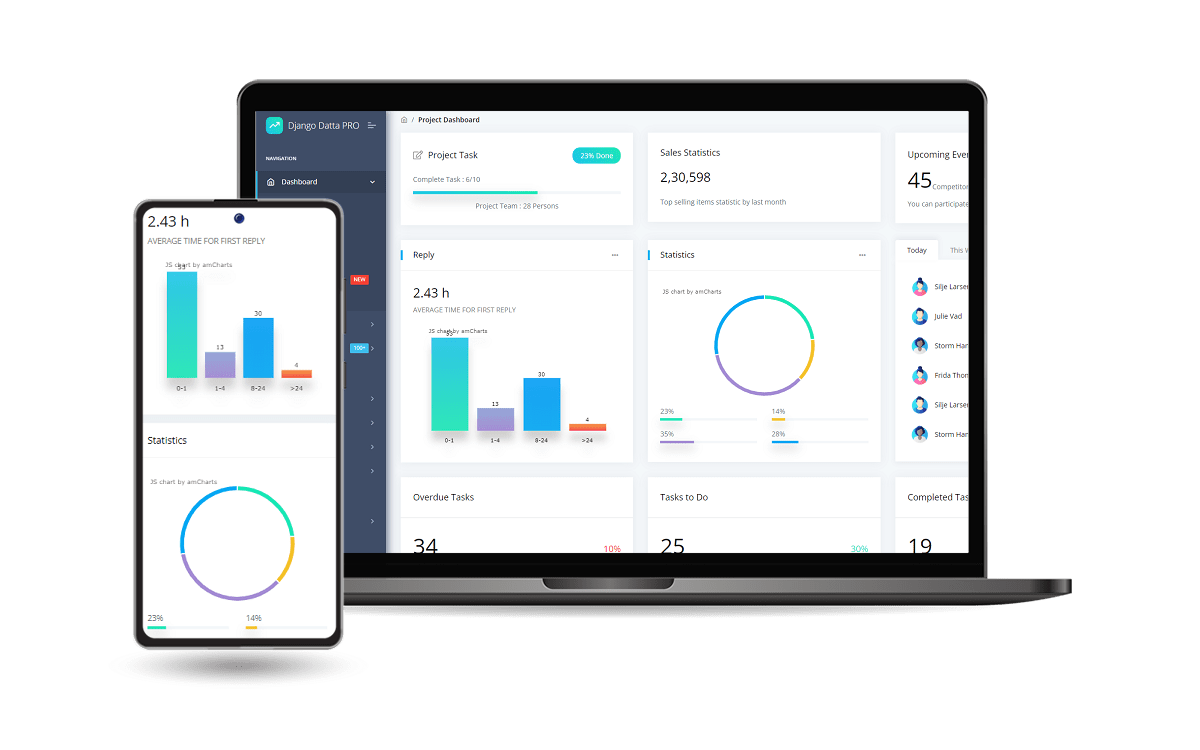Datta Able Flask
Open-source Flask Dashboard generated by AppSeed op top of a modern design. Datta Able Bootstrap Lite is the most stylised Bootstrap 4 Lite Admin Template, around all other Lite/Free admin templates in the market. It comes with high feature-rich pages and components with fully developer-centric code. Before developing Datta Able our key points were performance and design.
- 👉 Datta Able Flask - Product page
- 👉 Datta Able Flask - LIVE deployment
Built with Datta Able Generator
- Timestamp:
2022-06-03 09:28 - Build ID:
0f8feffe-4e9a-4703-8875-8bcd6266c09c - Free Support (registered users) via
EmailandDiscord
Features
Up-to-date dependencies- Database:
sqlite DB Tools: SQLAlchemy ORM, Flask-Migrate (schema migrations)- Session-Based authentication (via flask_login), Forms validation
Download the code
$ # Get the code
$ git clone https://github.com/appseed-projects/0f8feffe-4e9a-4703-8875-8bcd6266c09c.git
$ cd 0f8feffe-4e9a-4703-8875-8bcd6266c09cInstall modules via
VENV
$ virtualenv env
$ source env/bin/activate
$ pip3 install -r requirements.txtSet Up Flask Environment
$ export FLASK_APP=run.py
$ export FLASK_ENV=developmentStart the app
$ flask runAt this point, the app runs at http://127.0.0.1:5000/.
Install modules via
VENV(windows)
$ virtualenv env
$ .\env\Scripts\activate
$ pip3 install -r requirements.txt
Set Up Flask Environment
$ # CMD
$ set FLASK_APP=run.py
$ set FLASK_ENV=development
$
$ # Powershell
$ $env:FLASK_APP = ".\run.py"
$ $env:FLASK_ENV = "development"Start the app
$ flask runAt this point, the app runs at http://127.0.0.1:5000/.
By default, the app redirects guest users to authenticate. In order to access the private pages, follow this set up:
- Start the app via
flask run - Access the
registrationpage and create a new user:http://127.0.0.1:5000/register
- Access the
sign inpage and authenticatehttp://127.0.0.1:5000/login
The project is coded using blueprints, app factory pattern, dual configuration profile (development and production) and an intuitive structure presented bellow:
< PROJECT ROOT >
|
|-- apps/
| |
| |-- home/ # A simple app that serve HTML files
| | |-- routes.py # Define app routes
| |
| |-- authentication/ # Handles auth routes (login and register)
| | |-- routes.py # Define authentication routes
| | |-- models.py # Defines models
| | |-- forms.py # Define auth forms (login and register)
| |
| |-- static/
| | |-- <css, JS, images> # CSS files, Javascripts files
| |
| |-- templates/ # Templates used to render pages
| | |-- includes/ # HTML chunks and components
| | | |-- navigation.html # Top menu component
| | | |-- sidebar.html # Sidebar component
| | | |-- footer.html # App Footer
| | | |-- scripts.html # Scripts common to all pages
| | |
| | |-- layouts/ # Master pages
| | | |-- base-fullscreen.html # Used by Authentication pages
| | | |-- base.html # Used by common pages
| | |
| | |-- accounts/ # Authentication pages
| | | |-- login.html # Login page
| | | |-- register.html # Register page
| | |
| | |-- home/ # UI Kit Pages
| | |-- index.html # Index page
| | |-- 404-page.html # 404 page
| | |-- *.html # All other pages
| |
| config.py # Set up the app
| __init__.py # Initialize the app
|
|-- requirements.txt # App Dependencies
|
|-- .env # Inject Configuration via Environment
|-- run.py # Start the app - WSGI gateway
|
|-- ************************************************************************The set up
- Create a FREE account on Heroku platform
- Install the Heroku CLI that match your OS: Mac, Unix or Windows
- Open a terminal window and authenticate via
heroku logincommand - Clone the sources and push the project for LIVE deployment
Step 1 - Download the code from the GH repository (using
GIT)
$ # Get the code
$ git clone https://github.com/appseed-projects/<YOUR_BUILD_ID>.git
$ cd <YOUR_BUILD_ID>Step 2 - Connect to
HEROKUusing the console
$ # This will open a browser window - click the login button (in browser)
$ heroku loginStep 3 - Create the
HEROKUproject
$ heroku createStep 4 - Push Sources to
HEROKU
$ git push heroku HEAD:masterStep 5 - Srt up the APP Environemnt in
HEROKU(.envfile is ignored by the platform)
DEBUG=TrueFLASK_APP=run.pyFLASK_ENV=developmentASSETS_ROOT=/static/assets
Step 6 - Visit the app in the browser
$ $ heroku openAt this point, the APP should be up & running.
Step 7 (Optional) - Visualize
HEROKUlogs
$ heroku logs --tailFor more components, pages and priority on support, feel free to take a look at this amazing starter:
Designed for those who like bold elements and beautiful websites, Datta Able is the most stylish Bootstrap 4 Admin Template compare to all other Bootstrap admin templates. It comes with high feature-rich pages and components with fully developer-centric code.
- 👉 Flask Datta PRO - product page
- 👉 Flask Datta PRO - LIVE Deployment
Datta Able Flask - Open-source starter generated by AppSeed Generator.


